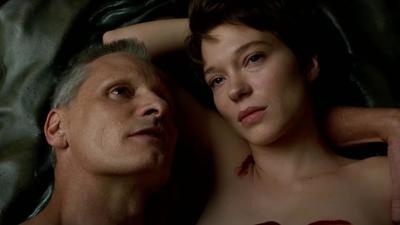David Cronenberg's "Crimes of the Future" is the story of an aging man. The man (Viggo Mortensen, 63) is the human race. Choking and shuffling, this "performance artist" can't eat, have sex or feel pain in the old ways, but he and a few others have grown new organs that adapt them to their polluted environment at the cost of their former humanity. Wow, it's funny.
With films such as "Rabid" (1977), "Videodrome" (1983) and "Dead Ringers" (1988), Cronenberg has always laughed at our sickness. His candy-colored, low-tech style makes his social commentary go down easy, and we always feel we're dealing with a subtle, engaging artist, not a preacher à la Adam McKay bludgeoning us with "Don't Look Up."
Cronenberg has constructed a "Future" with remarkable consistency and dark, dusty beauty. Everything's old. Archives are kept on paper. Everyone gets around by walking; even ships are used only as rusting backdrops. Specialized technology is operational . . . for the sake of art and sex!
That last Cronenberg obsession reaches a peak in "Crimes" -- organic yet surgical machines prod exposed innards and silky skin as faces writhe in ecstasy. We're reminded of the key line in "Andy Warhol's Frankenstein" (1973): "To know death, Otto, you have to f*ck life in the gallbladder!" (In 1987, Warhol died unexpectedly at 58 after gallbladder surgery.)
Indeed, the man needs to know death, but he's distracting himself from the great inevitable. As much as he tries to make art out of his novel tumors, it doesn't matter whether they're cancers or transformers: The former man will soon be gone. It's no accident that Cronenberg has dressed Mortensen in a black hood to resemble Death in Ingmar Bergman's "The Seventh Seal." The man not only embodies his own death, but represents the demise of his entire species.
As usual, Cronenberg depicts our ambivalence about every essential issue by filling "Crimes of the Future" with double agents and twins. Our main man is named Saul, after the persecutor-turned-champion of Jesus; he is courted by both extremes in the evolutionary and sexual wars. There are twin assassins of different ages who act alike and somehow look alike in different ways. Everyone is betraying his partner, and no one seems to care. There is even a sort of sacrificial neo-Christchild who is betrayed by everyone.
Time collapses, abetted by Howard Shore's score, which sounds as if it were performed entirely on a 1980 Fairlight synthesizer, all grandiose wheeze & cheese. "Everyone wants to be a performance artist"? Well, the cultural wheel keeps turning. If you're old enough and have replaced enough body parts, you've seen every touchstone return, as it will again and again until nothing returns.
Cronenberg's camera loves Léa Seydoux as Caprice, Saul's performance partner, and it should, because she is perfect. Kristen Stewart, "attractive, in a bureaucratic sort of way," is irresistibly twitchy.
After we stop chuckling at Cronenberg's deadpan jokes, and thinking about whether we should gulp another fistful of pills for our own acid reflux, stop watching the news, or just gulp a fistful of something stronger, we can think about another matter the director brings up.
Did we will all this destruction? If we can persuade ourselves that it's just evolution, we'll sleep better. And if we don't wake up, tough shit.

